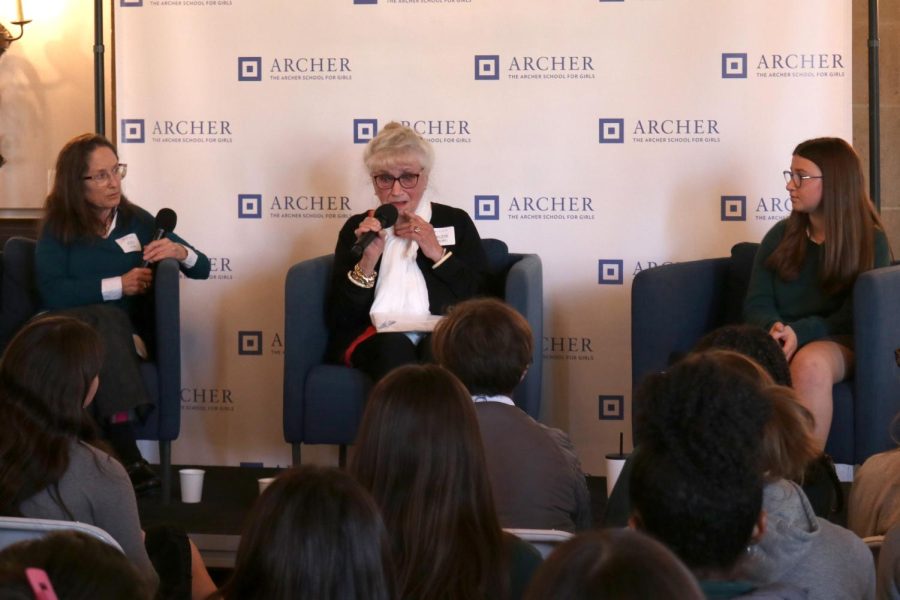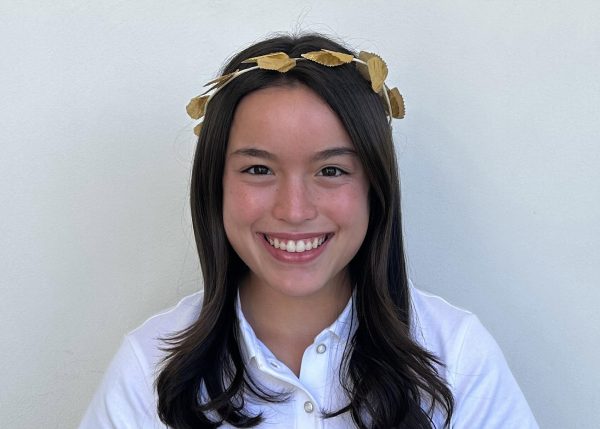Archer community commemorates International Holocaust Remembrance Day, hears from Holocaust survivor, artist Trudie Strobel
Photo credit: Meredith Ho
Holocaust survivor and artist Trudie Strobel speaks about her experiences during the Holocaust and the importance of her work as an artist throughout her life. Strobel spoke to the upper school, and the middle school watched from a livestream in mentorships, on International Holocaust Remembrance Day Friday, Jan. 27.
January 29, 2023
Antisemitic incidents reached an all-time high in the United States in 2021, according to the Anti-Defamation League. In addition, a 2020 survey from The Guardian revealed nearly two-thirds of young American adults do not know that 6 million Jewish people were murdered during the Holocaust.
These statistics highlight the need to educate people about the Holocaust and to commemorate the 6 million Jewish people and millions of other victims of Nazism. Additionally, they emphasize the importance of learning ways to fight against antisemitism and other forms of hatred to prevent future genocides. These are some of the goals of International Holocaust Remembrance Day, which took place Friday, Jan. 27.
The Archer community commemorated this day by hosting speakers Thursday, Jan. 26, and Friday, Jan. 27. The Anti-Defamation League Deputy Regional Director Ariella Lowenstein joined the Jewish Student Union and The Artemis Center Jan. 26 during lunch in room 152 to discuss the rise in antisemitism. The next day, all upper school students reported to the dining hall at 10:30 a.m. for the International Holocaust Remembrance Day assembly, where students heard from Holocaust survivor and artist Trudie Strobel.
During the first presentation, Lowenstein included statistics showing the increase in antisemitic incidents and presented on ways to fight against it, which included speaking up when antisemitic comments are made, reporting them on social media or to the ADL and sharing facts to be good consumers of media.
Jewish Student Union Executive Board member Rebecca Lazarus (’24) said one of the purposes of hosting these speakers is to begin a discussion about antisemitism, how it has been increasing and why it is important to learn about the challenges Jewish people face.
“Our hope is just to really get the conversation started,” Lazarus said. “We’ve been talking for over a year about trying to find ways to bring in a speaker and, specifically, a Holocaust survivor because it is such an important part of our history.”
Senior Sophie Wallack, with Strobel’s biographer Jody Savin, moderated the discussion Jan. 27. Holocaust survivor Strobel spoke about her journey, the importance of compassion and tolerance and how art has been essential to her healing. Middle school students watched the assembly virtually in mentorships.
Students were given the option to submit questions for Strobel through their mentors to engage more directly in the event. Co-founder of Anne Frank House L.A. Harvey Shield presented opening remarks, introduced Strobel and discussed the context of the rise in antisemitism in the U.S. Last June, Archer partnered with Anne Frank House L.A. to host the “Anne Frank: A History for Today” exhibit.
“In the U.S.A. today, we see increasing political violence, increasing racial hatred and increasing religious intolerance, particularly antisemitism,” Shield said in the opening remarks introducing Strobel. “These are the same trends that were prevalent in Germany before the rise of Nazism, and that’s why it’s more important now than ever to teach the lessons of the Holocaust so that we never forget.”
Before Strobel was born, her father was a victim of Stalin’s Campaigns of Terror, and when she was 4 years old, she and her mother were forced from their home by Nazis. They marched more than 600 miles to the Lodz Ghetto and then to a labor camp. Strobel’s mother was an incredibly talented seamstress, and her sewing ability saved their lives.
“It all starts when you have someone sitting next to you, and you think they’re not as worthy as yourself … we have to have respect for everyone, and we all look different, and I think it’s so beautiful. We don’t all want the same eyes or the same color. It’s all the colors of life that are in the world — this is what makes us a cohesive society,” Strobel said to the upper school. “We must never forget the Holocaust … this must never happen again because the religious belief is the right that we have as a human being.”
In Savin’s book about Strobel, “Stitched and Sewn,” she recounts how sewing and art saved Strobel’s life twice and includes photographs of her artwork. Art and stitching became a way for Strobel to express herself and represent and record Jewish history. Strobel’s art ranges from embroidery portraits to dolls and beadwork. Two of Strobel’s art pieces were displayed in the dining hall during the assembly, and she explained the stories and messages behind them.
To end her speech, Strobel spoke about the necessity of respect, civility and compassion in order to create a world that is as beautiful and diverse as art, where she sees each individual person as a flower with its own unique color.
“Genocide is not confined to our past. Genocide and ethnocide persist in our world today, and it is to all of us to stand up for tolerance, inclusion and compassion, and we need civility to return,” Strobel said. “Respect and civility and compassion. These are my words for life. And if we keep them in us, we would have the most beautiful flower world.”









